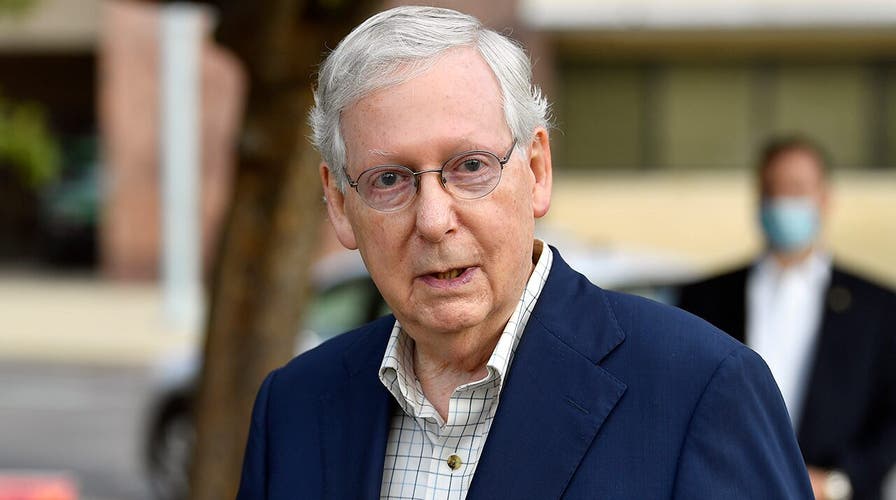Fox News Flash top headlines for December 8
Fox News Flash top headlines are here. Check out what's clicking on Foxnews.com.
Treasury Secretary Steven Mnuchin said he spoke with House Speaker Nancy Pelosi, D-Calif., and offered a package even bigger than the bipartisan $908 billion COVID relief package.
He said he'd presented a bill on behalf of the president amounting to $916 billion. The bill includes funding for state and local governments, liability protections and would be funded by $140 billion in unused funds from the Paycheck Protection Program and $429 billion in Treasury funds.
"I have reviewed this proposal with the President, Leader McConnell and Leader McCarthy," Mnuchin said in a statement.
But earlier, Senate Majority Leader Mitch McConnellc, R-Ky., alled on negotiators to “set aside” liability protections and state and local funding, top Republican and Democratic priorities, for a future coronavirus relief bill.
"We know the new administration is going to be asking for another package. So I ask that we set aside liability [protections], set aside state and local [funding] knowing full well we'll be back at this after the first of the year,” McConnell said at a Senate GOP lunch.
“Leaving here without a COVID relief package cannot happen,” the Kentucky Republican continued.
A bipartisan group of senators on Tuesday unveiled a $908 billion coronavirus relief deal last week that included about $300 billion in funding for small businesses through the Paycheck Protection Program, $240 billion in aid for state and local governments, $180 billion to extend boosted unemployment benefits at $300 per week for four months and a temporary moratorium on COVID liability lawsuits to allow states enough time to design their own laws.
MCCONNELL PLANS FOR NEW CORONAVIRUS RELIEF BILL THAT TRUMP WILL SIGN INTO LAW
The bill was endorsed by the House Problem Solvers Caucus, a 50-member bipartisan group that's evenly divided between Republicans and Democrats.
During negotiations over a second coronavirus relief bill, House Speaker Pelosi had refused to back anything less than $2 trillion that included unrelated liberal pet issues, such as a limit to tax breaks for affluent people. She then signaled her support last week for a bipartisan, $908 billion package, citing that "we have a new president" and vaccines are on the way.
But McConnell poured cold water on the $908 billion package, saying he has his own targeted coronavirus relief bill based on what President Trump would sign into law.
McConnell said he talked with Mnuchin to ascertain exactly what Trump would sign into law. That proposal -- pegged at roughly $500 billion -- was circulated to Senate Republicans Tuesday and will be the basis of the next GOP COVID-19 relief effort.
A copy of the proposal obtained by Fox News shows the legislation includes liability protections for businesses, more than $300 billion in new Paycheck Protection Program money for employers, $105 billion for schools to reopen and an extension of unemployment benefits through Jan. 31 with a two-month phase-out. Not included in the legislation is another round of direct stimulus checks of $1,200, rental assistance or state and local funding.
The timeline for the coronavirus relief bill is around the corner. Government funding ends on Dec. 11 at 11:59 p.m., and Congress must pass a new spending bill to avert another shutdown. McConnell said the $1.4 trillion omnibus spending bill could be the "vehicle" to add on the latest coronavirus relief legislation.
BIPARTISAN GROUP OF SENATORS UNVEIL $908B CORONAVIRUS RELIEF PROPOSAL AMID GRIDLOCK
"I think it all might become one package," McConnell said.
Meanwhile, Sen. Chuck Schumer, D-N.Y., blasted McConnell for the "partisan" approach and urged the majority leader to work with Democrats.
Schumer and Pelosi sent McConnell a new offer Monday night to get the ball moving on bipartisan talks. The details of their offer were not made public.
CLICK HERE TO GET THE FOX NEWS APP
Congress has not passed a coronavirus relief bill since the $2.2 trillion package Trump signed in March.
Fox News' Marisa Schultz and David Rutz contributed to this report.




